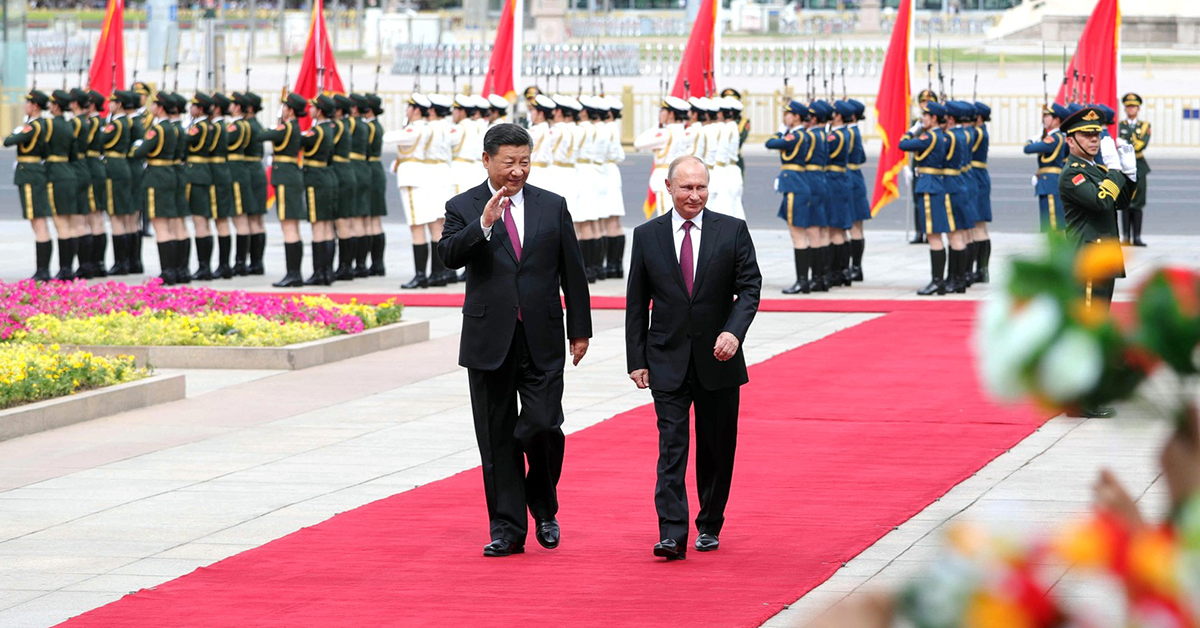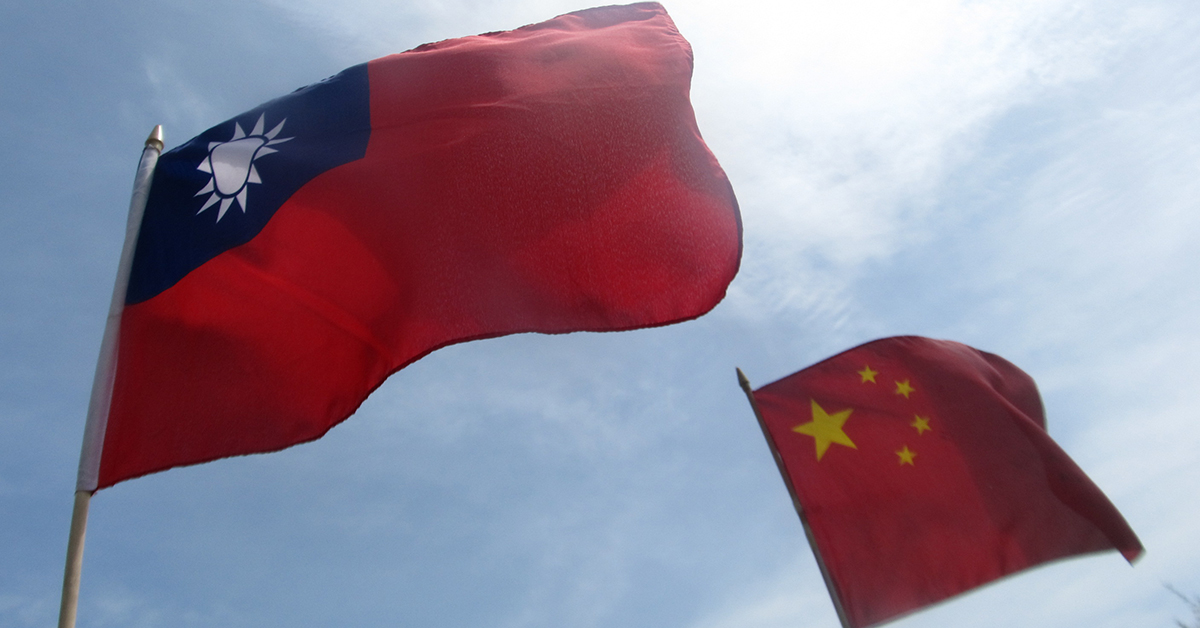This was published by the China Global South Project on 25 February 2022. China Foresight is affiliated with the China Global South Project and regularly provides opinion pieces for the weekly IDEAS China Global South newsletter. Click here to subscribe to the newsletter.
The world watches as a large-scale Russian invasion of Ukraine unfolds, after a prolonged period of guesswork around Putin’s strategic intentions. Millions of Ukrainians fear for their lives and seek shelter from Russian airstrikes and artillery. Commentators now look to answer questions about Beijing’s intentions. Will China recognize the Luhansk and Donetsk Peoples Republics? Will China be emboldened to enforce its claims in the Pacific? Will China and Russia reap a new world order in their spheres of influence across the Global South? Is this a “new cold war”? These questions do not have simple answers.
The Sino-Russia relationship has reached new heights over the past few years: as the recent China-Russia joint communique states, ‘friendship between the two States has no limits [and] there are no “forbidden” areas of cooperation’. The meaning of ‘no limits’ is seen in China and Russia’s closer cooperation on a host of issues including military exercises and energy security. On Wednesday, China Foresight hosted an event with leading energy experts discussing the growing integration of China’s provinces northwards into the liquified natural gas economy of the Russian Far East. One panellist stressed that the Arctic should now be seen as “Eurasian”, reflecting how the steadily growing Russia-China relationship is gradually reshaping the regional order.
Moscow and Beijing have also taken part in over 30 joint military exercises over the past two decades, which also connects to both states’ broader agenda throughout the Global South. For instance, in 2019, China, Russia, and South Africa arranged an unprecedented joint military exercise which raised more than a few eyebrows in Western capitals. Cooperation is not all sunshine and rainbows, however. While bilateral and trilateral exercises are symbolically important, they usually lack jointness, command and control integration, and interoperability, reflecting a trust deficit in the China-Russia security relationship. Chinese and Russian defence companies also increasingly compete over arms markets in Africa and the Middle East, reflecting how Chinese systems have become increasingly technologically advanced and commercially competitive.
Similarly, both countries have been vying for strategic influence in Africa, evidenced by Russia’s attempt to copy China’s Forum on China Africa Cooperation with a similar regional summit that took place in Sochi in 2019; a second one is scheduled later this year in Addis Ababa and was announced just after the last FOCAC concluded in Senegal last December. Russia has also increasingly courted traditional African partners of China such as Sudan, attempting to establish what would be Russia’s first military base on the continent in Port Sudan overlooking the Red Sea.
It’s too soon to evaluate precisely how the invasion of Ukraine will affect this evolving competition and cooperation. At the time of writing, China has tried to avoid taking a clear stance on Russia’s actions – the call for ‘all parties concerned to exercise restraint is being used so often that it has become comical.
While China has not condemned Russia’s recognition of Luhansk and Donetsk and the decision to deploy Russian military forces, foreign minister Wang Yi has emphasized that “[t]he sovereignty, independence and territorial integrity of any country should be respected and safeguarded” at the Munich Security Conference last weekend. At the same time, Beijing has emphasized how the security concerns of all parties (i.e. especially Russia) must be respected, reflecting Beijing’s dislike of NATO; a position that both Moscow and Beijing can readily agree on. On Wednesday, Chinese Foreign Ministry Spokesperson Hua Chunying accordingly told reporters that US arms sales and rhetoric were in fact “…heightening tensions, creating panic and even hyping up the possibility of warfare.”
But Yu Jie, former head of China Foresight, notes that Russia’s actions have become a “sticky point” for Beijing. It will be difficult for China to remain neutral should all-out war break out, and China is keen to keep a low profile given the politically important year in Beijing with the upcoming party congress and the expected prolonging of Xi’s time in office.
The issue of sovereignty may also prove contentious. Putin’s rambling speech on Monday appeared to challenge the notion of Ukraine’s sovereignty altogether, going beyond previous claims of Russian insecurity due to NATO expansion. This stands in contrast to the joint statement released by China and Russia earlier this month, which made seven references to the importance of upholding states’ individual sovereignty. This new development puts China in an uncomfortable position, forcing it to perform rhetorical acrobatics to distance itself from Russian aggression which conflicts with China’s foreign policy principles. China has been keen to make clear that its unwavering approach to Taiwan is qualitatively different to Russia’s volatile and revisionist claims over Ukraine (see for example Hua Chunying’s lengthy response on why “Taiwan for sure is not Ukraine”).
Perceived changes in Russia and China’s respective understandings of sovereignty will have broader implications for their relationship with Global South countries. While China’s oft-proclaimed principle of non-interference may not always translate into diplomatic practice and is commonly mediated through national interests, Beijing is certainly interested to pay lip service to the rhetoric of sovereign statehood. After all, both Russia and China have blocked implementation of ‘Responsibility to Protect’ (R2P) on the basis of upholding sovereignty. Russia’s conspicuous violation of Ukraine’s territorial integrity muddies this stance.
Consider the powerful speech made by Kenya’s Ambassador to the United Nations, Martin Kimani, on Tuesday: “Kenya and almost every African country was birthed by the ending of empire… rather than form nations that looked ever backward in history with a dangerous nostalgia, we chose to look forwards to a greatness none of our many nations and peoples had ever known. We rejected irredentism and expansionism on any basis, including racial, ethnic, religious or cultural factors. We reject it again today”.
China and Africa trumpet their shared respect for sovereign boundaries, and this is in many ways a foundation of their friendship: with the exception of eSwatini, every African country recognizes the One-China principle. How China reacts to Russia’s expansion into Ukraine could reverberate throughout its carefully crafted relationships throughout the Global South.
Finally, to repeat a plea we’ve often made before, we should be cautious of understanding these dramatic events solely from a great power perspective. Conflict in eastern Europe paired with renewed interest in the China-Russia friendship has added fuel to the increasingly popular rhetoric of a “new cold war”. But this gives conceptual power to the notion of an “old cold war”, an imagined history in which a battle between East and West ended peacefully in 1991. But as postcolonial scholars have pointed out, this ignores the experiences of conflict and violence which shaped the global south as the battleground of the cold war, the effects and costs of which are certainly not finished for those still experiencing them. The “old” cold war is not so old in the collective memory of many of the populations of these countries.
In other words, when we hear the claims bandied around of a “new cold war” we should instinctively ask “who’s cold war?”. We surely need more novel, more accurate categories to understand some of the historic changes taking place and their relationship to the Global South.
This article gives the views of the authors, and not the position of the China Foresight Forum, LSE IDEAS, nor The London School of Economics and Political Science.
The blog image, President Vladimir Putin with President of China Xi Jinping, is licensed under CC BY 4.0.





